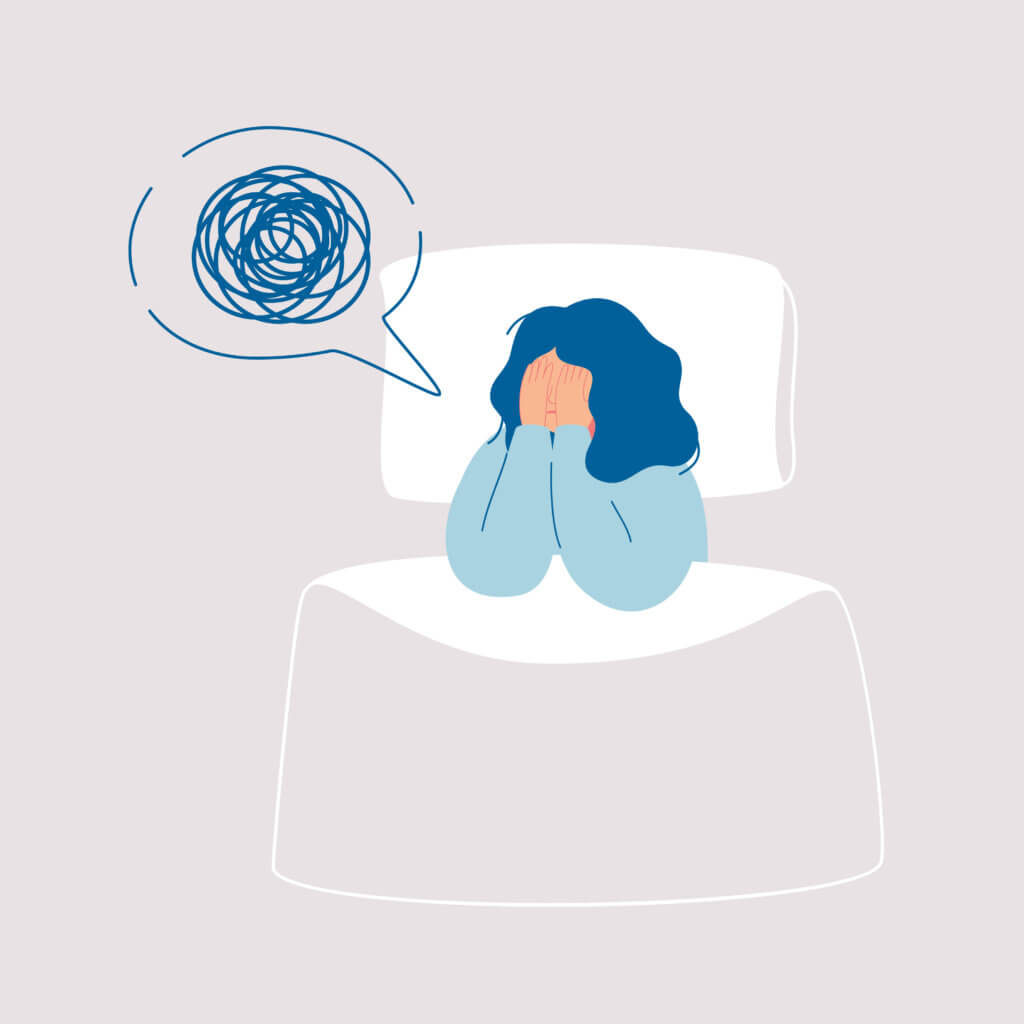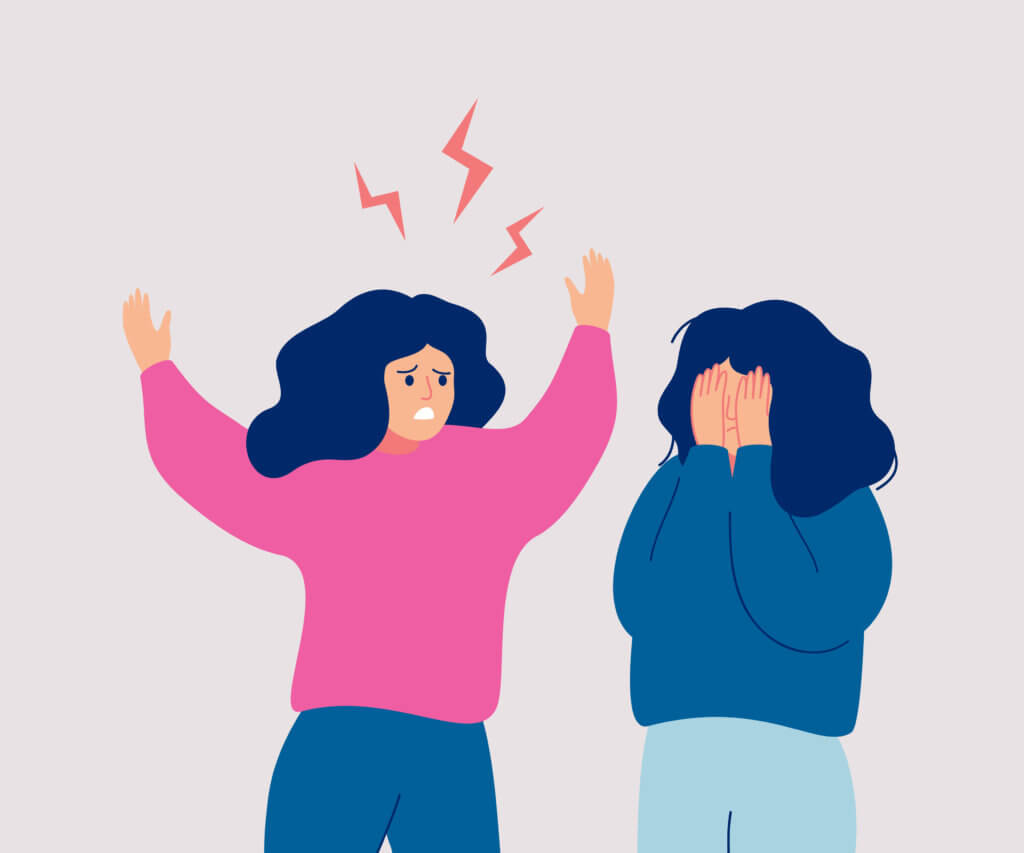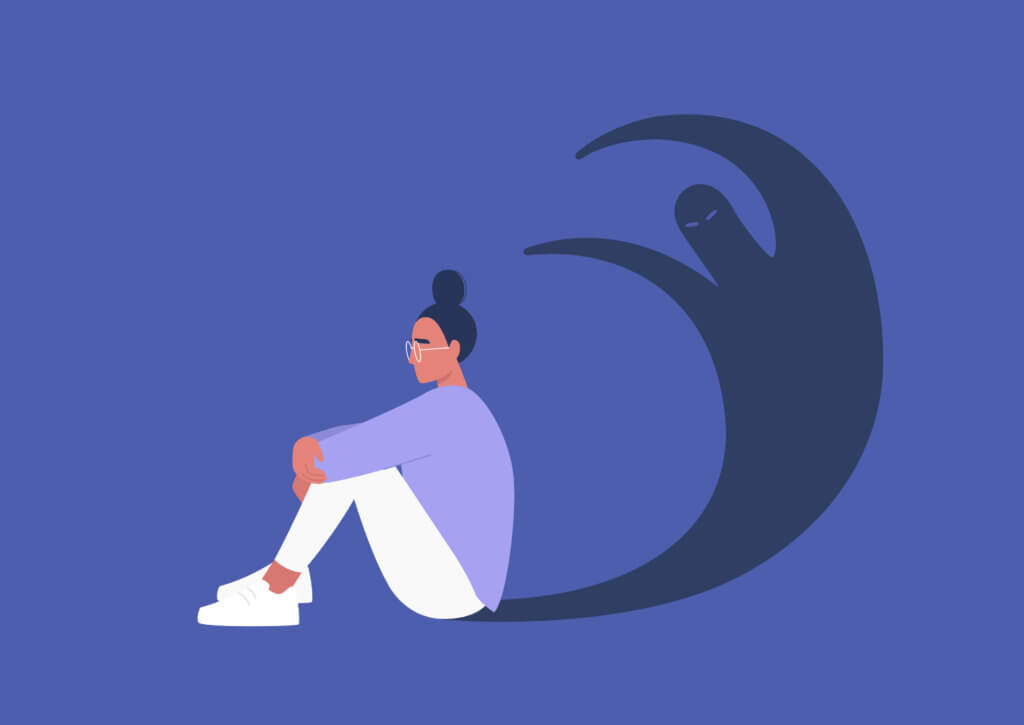Anxiety is a mental health condition that affects how someone thinks, feels, and behaves. Typically, the emotional symptoms of anxiety are well known, but this condition can also cause a range of physical symptoms. Although anxiety disorders are highly treatable, many people suffer for a long time before receiving appropriate treatment. Therefore, it’s important to understand and recognize anxiety symptoms as early as possible in order to prevent the symptoms from getting worse.

Physical Symptoms of Anxiety: How Does It Feel?
Physical anxiety symptoms can vary in intensity from person to person. Some people experience very intense feelings, while others feel a milder form. These are some of the most common symptoms of physical anxiety:
- Sleep problems
Many people with anxiety experience changes or inconsistencies in their sleep patterns. People experiencing chronic anxiety or chronic stress often either get too little sleep (less than 6 hours) or too much sleep (more than 9 hours). In addition to impacting sleep quantity, anxiety may also impact sleep quality, causing non-restorative sleep, or restless sleep. When a person isn’t getting enough quality sleep, their anxiety symptoms may become even worse, compounding the problem. Sleep changes related to mood or anxiety disorder recurrence can include:
- Taking a long time to fall asleep
- Waking up frequently
- Lying awake in bed for hours or having unexplained pain
- Not feeling refreshed after a full night’s sleep
- Appetite or weight changes
Eating too much and not eating enough can be signs of anxiety. For those with anxiety, just the task of preparing a meal can feel overwhelming and lead to a spike in stress hormones. This ‘fight-or-flight’ response can decrease appetite, ultimately making a person more susceptible to physical illness.
Anxiety can also result in emotional eating. Emotional eating is when a person’s need to eat is not associated with physical hunger. When patients eat in response to their emotions, they are soothed by the food as it changes the chemical balance in the brain, produces a feeling of fullness that is more comfortable than an empty stomach, and improves mood through positive association with happier times. This unhealthy eating pattern is often associated with post-traumatic stress disorder, or PTSD, and can lead to many health problems down the road.
- Heart palpitations
When you’re nervous, your heart starts pumping faster, and you may feel your chest tightening or your heart beating irregularly. This is due to the fact that your body produces adrenaline and other stress hormones in response to perceived threats. Chest pain and moments of high blood pressure are likely not dangerous on their own, but they can be uncomfortable and feel scary. The best thing you can do in this situation is to breathe deeply and evenly.
- Shortness of breath
Another major physical symptom of an anxiety disorder is the sensation of not being able to breathe properly. This is accompanied by the feeling of suffocation or of being smothered. You may feel like you’re drowning or like your chest is collapsing in on itself. In this case, it’s very important to connect with your body. Breathe in and out as deeply and evenly as you can. You may be experiencing a panic attack. Panic attacks are a sudden and overwhelming sense of anxiety and doom, and can be extremely disturbing. If you are struggling with recurring panic attacks, you should seek the help of a mental health professional.
- Excessive sweating
Anxiety disorders can cause you to sweat more than usual, and during a panic attack, you may even feel like you’re sweating from every pore in your body. This is because your body is preparing for flight or fight.
- Dry mouth
When you’re nervous, you may experience physical symptoms of anxiety, such as a dry mouth, which can make it difficult to speak. This is because your body is trying to conserve water so that if you need to fight or run a long distance, you can go longer without needing a drink or using the bathroom.
- Dizziness
Anxiety can often cause your blood pressure to increase, which can result in dizziness or increased heart rate.
- Irritability and anger
Everyone feels irritable sometimes. But, changes in the frequency or severity of your irritability — a reduced control over one’s temper that results in outbursts — could signal anxiety. Signs of irritability can include feeling like you ‘woke up on the wrong side of the bed’, saying things you don’t mean, using sarcastic humor to put people down, struggling to stay productive at work because you’re annoyed by people around you or you just can’t stay focused, or even just experiencing road rage. Anxiety symptoms related to anger and irritability may include mood swings, feeling guilty or ashamed about anger, being prone to stress over small criticism, or even being easily annoyed by the close physical or emotional proximity of others.
- Getting sick more than usual
Because the immune system doesn’t function as well when the body’s fight-or-flight response is activated for a long time, people with anxiety also tend to get sick more often.
- GI upset or frequent urination
The anxiety-related fight-or-flight response can cause feelings of gastrointestinal distress, including digestive problems, irritable bowel syndrome, diarrhea, as well as frequent urination. You shouldn’t be embarrassed to discuss these symptoms with your doctor as they are a normal part of the body’s stress response.
- Headaches or muscle tension
Headaches are one of the most common physical symptoms of anxiety disorders. This is because anxiety can cause your blood pressure to rise. This can result in pressure building up inside your skull, which leads to a headache. Anxiety can also cause other unexplained instances of muscle tension, ‘pins and needles’ sensation and pacing or shuffling of the feet.

Cognitive Symptoms of Anxiety
In addition to the physical symptoms of anxiety that are more visible, there are other symptoms of anxiety that are not always as obvious. Anxiety also affects the mind. The way we think and perceive situations is altered. Here are some cognitive symptoms of anxiety:
- Fear of going crazy
When we are anxious, our minds may start to play tricks on us. We may begin to have irrational thoughts and fear that we’re going crazy. This is because anxiety can cause us to misinterpret things and see them in a negative light.
- Intrusive thoughts
Anxiety disorders and other mental health conditions can also cause us to have intrusive thoughts. These are unwanted, repetitive thoughts that we cannot control. Intrusive thoughts can be about anything, but they often involve themes of violence or harm.
- Obsessive thinking
Anxiety disorders can also lead to obsessive thinking. This is when we fixate on a certain thought or worry and cannot let it go. We may obsessively ruminate on what could happen, or what we should have done differently.
- Fear of losing control
Generalized anxiety disorder can make us feel like we’re out of control. This can make us afraid that if we don’t get things under control, we will never get them back again.
- Fear of making a fool of yourself
When we are anxious – or have a social anxiety disorder – we may fear that we will say something stupid or embarrassing. We may fear that we will act in an awkward way or that we will do something that will make us look bad. In these situations, it’s important to be mindful of our thoughts and actions. Slowing down and doing things deliberately – with the mindset of “I’m going to do this well” – can really help bring your mind and body back into focus.
- Fear of dying
Anxiety can also cause us to fear that we are going to die. This may seem like an irrational fear, but it is actually quite common. Anxiety disorders can cause us to have a heightened sense of awareness of our bodies and our surroundings. This can make us feel like something is wrong, even when nothing is actually wrong.

How to Cope with Physical Symptoms of Anxiety
Here are some ways you can cope with physical symptoms of anxiety and other mental health conditions:
- Breathe mindfully
When you feel your anxiety symptoms worsening, try taking deep breaths. Breathe in for four seconds and out for four seconds. Repeat until you feel like your symptoms are improving.
- Do some stretches
Try doing some light stretches to help relieve some of the tension in your body.
- Exercise
If you are able to, exercise can help to reduce anxiety disorder symptoms. Going for a walk is a great way to spend time outdoors and move your body in a way that feels good.
- Relaxation techniques
If you are having trouble relaxing, try some relaxation techniques. Here are some simple relaxation or self-care techniques that you can try:
- Take a warm bath
- Use a hot water bottle
- Massage
- Listen to calming music
- Try listening to music that calms you down.
- Take a shower
- Do yoga
- Take deep breaths
These are just some ideas for how you can cope with physical symptoms of anxiety. You can come up with other coping mechanisms that work best for you.
What to Do When Your Anxiety Symptoms Are Not Going Away
Sometimes, anxiety and panic disorder symptoms do not go away and can last for days or weeks. Anxiety symptoms can cause a great deal of distress and make it hard to continue with your daily life. In these situations, it is a good idea to seek help from a health professional.
There are many resources and treatments available to help you cope with anxiety, and there is no shame in seeking help. Remember, you are not alone. Millions of people suffer from anxiety, and many of them have found ways to manage their symptoms and live happy, fulfilling lives.
Some of the most common treatment options include:
Cognitive-behavioral Therapy
This type of talk therapy helps you to identify and change the thoughts and behaviors that contribute to your anxiety.
Medication
There are many different types of medication that can be effective in treating anxiety. Your doctor can work with you to find the right medication for you.
Relaxation techniques
Relaxation techniques can help you to cope with anxiety and manage your symptoms.
Exercise
Regular exercise can help to reduce anxiety and improve your overall health.
Support groups
Support groups provide a unique opportunity to connect with others who are facing similar challenges. This can be a valuable resource in managing anxiety.
Final Thoughts
Overall, anxiety is a very treatable condition. If you are struggling with anxiety, don’t hesitate to seek help. There are many resources available to help you manage your symptoms and live a happy, fulfilling life.
If you have tried a treatment plan in the past that has been unsuccessful in treating the physical effects or emotional effects of your anxiety, don’t give up hope. At Neuro Wellness Spa we are experts in complementary and alternative treatments for anxiety and depression. If traditional antidepressants or antianxiety medications aren’t working for you, treatments like TMS therapy or ketamine therapy can help you take back control of your life.


